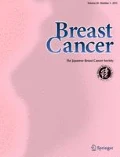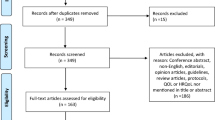Abstract
This article reviews recent topics in health outcomes research. First, we discuss the concept and importance of ‘subjective’ assessment of quality of life (QOL), and introduce new guidance, by the respective medical product regulatory authorities in Europe and the United States, for labeling claims of medical products that are assessed for outcomes related to QOL. Second, we address the application of item response theory (IRT) in developing and assessing QOL measures to compensate for several drawbacks of the classical psychometric approach, which has been commonly used to verify the reliability and validity of QOL instruments. Third, the relevance and determination of the minimally clinically important difference (MID) of QOL scores is discussed. Finally, we address the so-called ‘response shift’ which may affect the reliability of analysis results of QOL scores in longitudinal studies such as randomized clinical trials.
Similar content being viewed by others
Abbreviations
- QOL:
-
Quality of life
- HRQOL:
-
Health-related quality of life
- PRO:
-
Patient-reported outcomes
- IRT:
-
Item response theory
- CAT:
-
Computer adaptive testing
- MID:
-
Minimally important difference
- EBM:
-
Evidence-based medicine
- ES:
-
Effect size
- SD:
-
Standard deviation
- SEM:
-
Standard error of measurement
- RS:
-
Response shift
References
Litwin MS, Lubeck DP, Henning JM, Carroll PR: Differences in urologist and patient assessments of health related quality of life in men with prostate cancer: results of the CaPSURE database.J Urol 59:1988–1992, 1998.
Shimozuma K, Ohashi Y, Takeuchi gnA, Morita S, Ohsumi S, Sunada Y,Kuroi K, Makino H, Watanabe T, Hausheer FH; Validation of the Patient Neurotoxicity Questionnaire (PNQ) during taxane chemotherapy in a phase III randomized trial in patients with breast cancer: N-SAS BC 02. Proc. of 27th San Antonio Breast Cancer Symposium, 2004.
Shimozuma K, Ohashi Y, Takeuchi A, Aranishi T, Morita S, Kuroi K, Ohsumi S, Makino H, Watanabe T, Hausheer FH: Assessment and quantification of tax-ane-induced neurotoxicity in a phase III randomized trial of patients with breast cancer (AC followed by PAC/DOC vs. PAC/DOC alone): N-SAS BC 02.J Clin Oncol 24:473s, 2006.
‘Reflection paper on the regulatory guidance for the use of health-related quality of life (HRQOL) measures in the evaluation of medicinal products’ European Medicines Agency Pre-authorisation Evaluation of Medicines for Human Use, Committee for Medical Products for Human Use (CHMP), London, 27 July 2005, http://www.emea.eu.int/pdfs/human/ewp/13939104en.pdf
‘Guidance for industry patient-reported outcome measures: Use in medical product development to support labeling claims (Draft guidance).’ U.S. Department of Health and Human Services, Food and Drug Administration, Center for Drug Evaluation and Research (CDER), Center for Biologies Evaluation and Research (CBER), Center for Devices and Radiological Health (CDRH) Feb. 2006 http://www.fda.gov/CDER/GUIDANCE/5460dft.pdf
Patient-reported Outcomes measurement Information System (PROMIS). http://www.nihpromis.org/, Aug, 2006.
Wyrwich KW, Nienaber NA, Tierney WM, Wolinsky FD: Linking clinical relevance and statistical significance in evaluating intra-individual changes in health-related quality of life.Med Care 37:469–478, 1999.
Jaeschke J, Guyatt GH: Measurement of health status: Ascertaining the minimal clinically important difference.Control Clin Trials 10:407–415, 1989.
Doyle C, Crump M, Pintilie M, Oza AM: Does palliative chemotherapy palliate? Evaluation of expectations, outcome, and costs in women receiving chemotherapy for advanced ovarian cancer.J Clin Oncol 19:1266–1274, 2001.
Schwartz CE, Sprangers MAG: Methodological approaches for assessing response shift in longitudinal health-related quality-of-life research.Soc Sci Med 48:1531–1548, 1999.
Sprangers MAG, Schwartz CE: Integrating response shift into health-related quality of life research: a theoretical model.Soc Sci Med 48:1507–1515, 1999.
Author information
Authors and Affiliations
Corresponding author
About this article
Cite this article
Shimozuma, K., Imai, H., Kuroi, K. et al. Recent topics of health outcomes research in oncology. Breast Cancer 14, 60–65 (2007). https://doi.org/10.2325/jbcs.14.60
Published:
Issue Date:
DOI: https://doi.org/10.2325/jbcs.14.60



